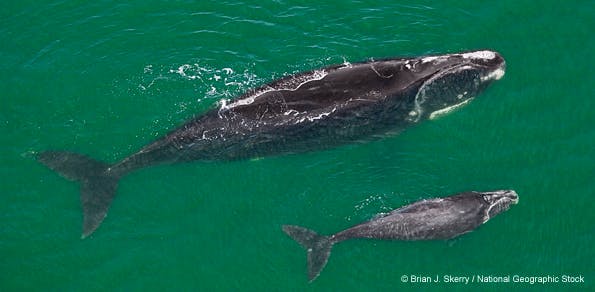Petition calls for stronger protections from ship strikes
Collisions with ships in the busy waters off the U.S. East Coast are one of the greatest threats to the critically endangered North Atlantic right whale. And with only about 400 of these animals left, every whale death can have a huge impact on the long-term recovery of the species.
 That’s why Defenders and a coalition of our conservation allies filed a petition today with the National Marine Fisheries Service, demanding stronger protections to guard against the threat of ship strikes.
That’s why Defenders and a coalition of our conservation allies filed a petition today with the National Marine Fisheries Service, demanding stronger protections to guard against the threat of ship strikes.
Temporary protections were put in place in 2008 that set speed limits in important whale habitat, including the species’ calving grounds off the coast of Florida, their feeding and breeding grounds off the coast of New England, and their well-traveled migration path in between. But those protections were arbitrarily set to expire in December 2013, even though the threat of ship strikes remains.
As a result, Defenders is asking federal officials to extend the current ship speed limits, apply them to additional areas where ship strikes are likely to occur, and lengthen the amount of time that seasonal protections are in place.
As Defenders senior staff attorney Sierra Weaver says:
“Protections for highly endangered whales should not be removed until the whales have recovered. We hope the agency will follow the advice of its own experts and act quickly to make sure there is no gap in protections.”
Read the coalition’s press release about extending right whale protections.
In past centuries, North Atlantic right whales were decimated by the commercial whaling industry, and while whaling is no longer a threat, other man-made problems like ship strikes and entanglement in fishing gear continue to regularly kill and seriously injure whales.
Right whales received federal protection under the Endangered Species Act in the early 1970s but still have not recovered. Females don’t reach reproductive maturity until age eight, and they only give birth to one calf every four years. Furthermore, these reproductive females and their babies are both the most important animals to the future of the species and the most vulnerable to ship strikes because they spend more time near the surface of the water.
Extending seasonal boat speed limits is the best way to ensure as many right whales as possible are able to survive and reproduce.





